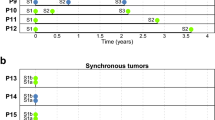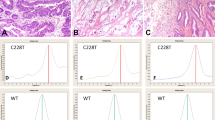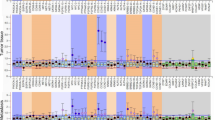Abstract
The structure and expression of the proto-oncogene c-erbB-2 was studied in 86 patients with transitional cell carcinoma. Initial tissue samples comprised 37 grade 1, 32 grade 2 and 13 grade 3 tumours and four cases of carcinoma in situ. At the time of this first tumour sample, amplification of the c-erbB-2 gene was demonstrated by Southern blotting in 1/37 grade 1, 5/32 grade 2 and 6/13 grade 3 tumours (0.005 less than P less than 0.01). Tumour 're-occurrences' were obtained from 23 of these patients on one or more occasions. Amplification was detected in re-occurrences from seven of these 23, none of whom showed amplification in the first tumour sample. DNA was also extracted from exfoliated cells in urine collected from five cases of carcinoma in situ and c-erbB-2 amplification was demonstrated in one of these. No gene amplification was identified in patients' lymphocytes, ten biopsies of normal urothelium and 22 various intravesical pathologies. Increased expression of c-erbB-2 mRNA correlated with amplification of the gene. In addition, raised levels of mRNA were seen in the absence of gene amplification in six tumours. Immunoblotting using the polyclonal antibody 21N, raised against the c-terminus of the c-erbB-2 protein demonstrated increased amounts of a 185 kD immunoreactive protein in tumours with increased c-erbB-2 gene copy number compared with control tissues. In some tumours with high c-erbB-2 gene copy number, a 155 kD immunoreactive protein not detected in controls was expressed at higher level than the 185 kD protein. Immunocytochemistry using a monoclonal antibody AB-3, raised against the c-terminus of the c-erbB-2 protein, showed a positive reaction in the cytoplasm and cell membrane of tumours with gene amplification and in 40% of tumours with no amplification. An association was found between c-erbB-2 amplification and over-expression and the development of tumour re-occurrences. We suggest that c-erbB-2 amplification and over-expression may provide a useful molecular marker in transitional cell carcinoma of the bladder and merits further investigation as a potential prognostic indicator.
This is a preview of subscription content, access via your institution
Access options
Subscribe to this journal
Receive 24 print issues and online access
$259.00 per year
only $10.79 per issue
Buy this article
- Purchase on Springer Link
- Instant access to full article PDF
Prices may be subject to local taxes which are calculated during checkout
Similar content being viewed by others
Author information
Authors and Affiliations
Rights and permissions
About this article
Cite this article
Coombs, L., Pigott, D., Sweeney, E. et al. Amplification and over-expression of c-erbB-2 in transitional cell carcinoma of the urinary bladder. Br J Cancer 63, 601–608 (1991). https://doi.org/10.1038/bjc.1991.139
Issue Date:
DOI: https://doi.org/10.1038/bjc.1991.139
This article is cited by
-
Role of tyrosine kinases in bladder cancer progression: an overview
Cell Communication and Signaling (2020)
-
Up-regulation of HER2 by gemcitabine enhances the antitumor effect of combined gemcitabine and trastuzumab emtansine treatment on pancreatic ductal adenocarcinoma cells
BMC Cancer (2015)
-
Selection of a novel DNA thioaptamer against HER2 structure
Clinical and Translational Oncology (2015)
-
Prognostıc Value of Increased her2 Expression in Cancers of Pancreas and Biliary Tree
Pathology & Oncology Research (2015)
-
Chromosomal imbalances in human bladder urothelial carcinoma: similarities and differences between biopsy samples and cancer stem-like cells
BMC Cancer (2014)



